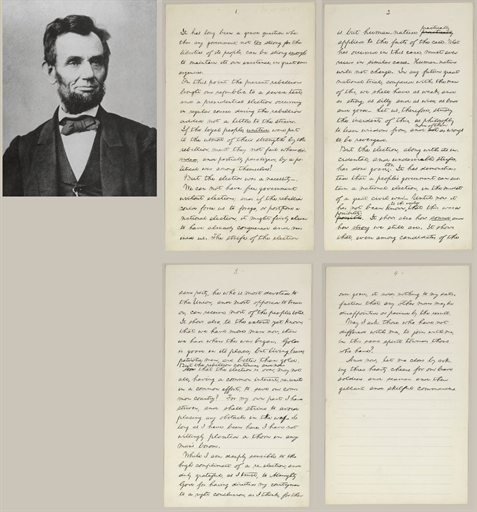
Image courtesy of Christie’s Images, Ltd., 2009.
On November 10, 1864, two days after northern citizens reelected him, President Abraham Lincoln addressed some 1,500 late—night supporters gathered outside the White House. Standing at the window over the north portico, Lincoln spoke from carefully prepared notes about the wartime turmoil that had “brought our republic to a severe test” and nearly jeopardized the national election itself. Although the President modestly described his performance “not very graceful,” scholars consider the victory speech among his most important public addresses. Christie’s will auction Lincoln’s handwritten text—on four large pages of high quality, lined paper—in New York on February 12, the bicentennial of Lincoln’s birth. The estimate for the single-lot sale is $3 to $4 million.
Holding an election during the Civil War clearly amounted to a major challenge, and Lincoln was by no means assured a second term. “The victory speech is a reminder that the 1864 election was not an automatic event, that its postponement was possible,” says Harold Holzer, noted Lincoln historian and co-chairman of the Lincoln Bicentennial Commission. Lincoln nevertheless achieved, against all odds, a more decisive victory over the Democratic challenger George B. McClellan than anyone expected (and without the rioting that many predicted). “This was Lincoln’s moment of triumph,” Holzer explains. “He emerged from the election victorious, and it was a really sweet moment of triumph for him.”
With echoes of his more famous 1863 Gettysburg Address, Lincoln’s election victory speech is a watershed document for both its length and its substance. He eloquently presented the successful election as evidence of the Union’s fundamental strength and appealed for unity and common purpose after a hard fought campaign.
Lincoln penned his powerful prose in dark ink, paginating each sheet in the center of the top margin. Even though the manuscript represents his final version, there are six places where he altered phrasing, suggesting how deliberate and reflective Lincoln was as a writer and editor. His handwriting, moreover, is a pleasure to read. “Lincoln didn’t have a scrawl,” Holzer says. “He had very beautiful penmanship. Even his insertions are legible. The speech is written in a very large, bold script. His large hand was easy to read by candlelight from the window. He knew it was going to be an important moment.”
Lincoln’s writings have fared well at auction. Last April, his 1864 letter replying to abolitionist pleas on behalf of enslaved children was purchased by a private American collector at Sotheby’s for $3.4 million—the record for both a Lincoln manuscript and for a presidential manuscript. Whether the sluggish economy will have an impact on Christie’s auction of the 1864 victory speech is anybody’s guess, but fiscal troubles do not seem to have diminished interest in it. “We feel pretty confident with the estimate. Documents like this don’t come up for auction very often,” said Christie’s Sung-Hee Park. Before the auction, the pages of Lincoln’s speech briefly toured the country. The manuscript was featured in a timely, post-Inauguration exhibition at the Corcoran Gallery of Art in Washington on January 22 and 23 and was displayed at Christie’s offices in Chicago on February 4.
Update: Abraham Lincoln’s 1864 victory speech was sold for $3,442,500, a new world record for a Lincoln manuscript.
